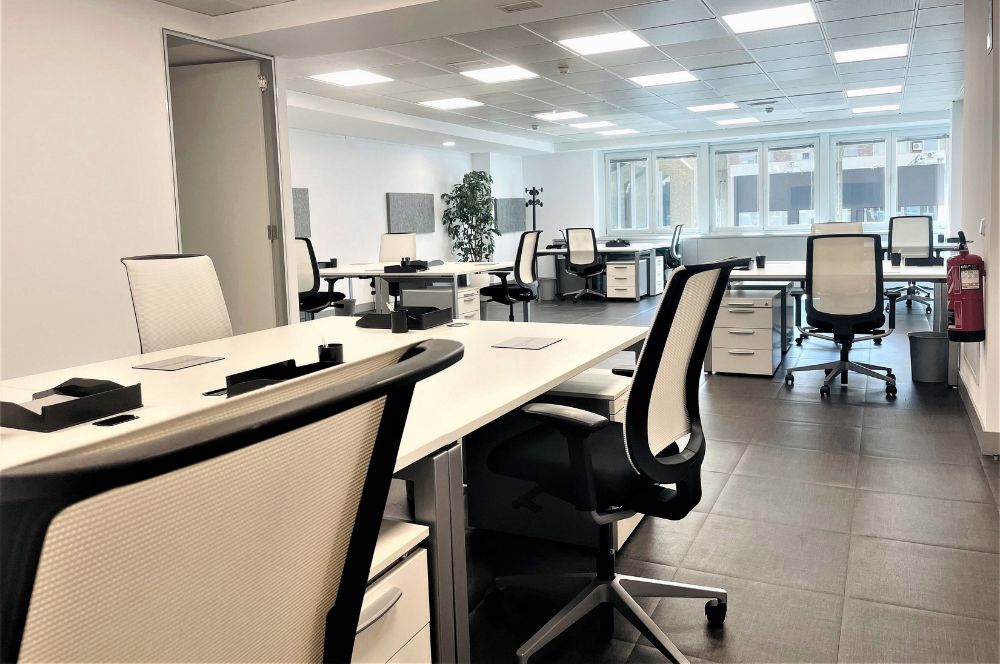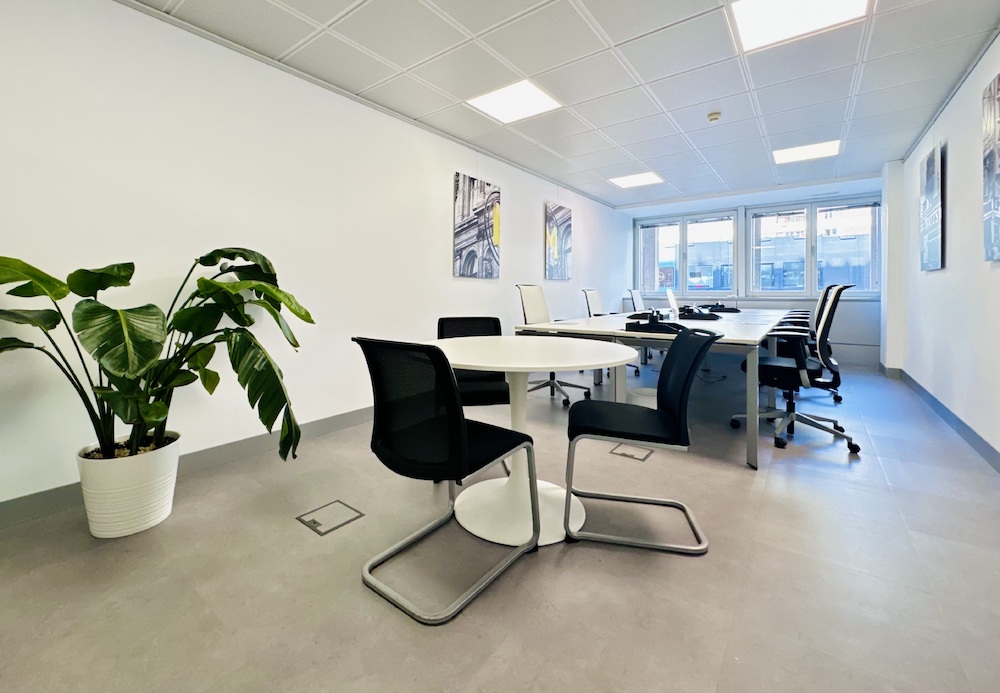There is a revolution underway that is radically changing the face of the workplace as we know it. In a world where adaptability and flexibility have become vital currencies, flexible offices are emerging as the answer to the changing needs of modern professionals.
This phenomenon, in contrast to the rigidity of traditional offices, is redefining the boundaries of what a workspace can and should be.
Imagine a place where innovation is cultivated, collaboration is intrinsic, and every detail, from furniture design to location, is designed to maximise productivity and well-being. This is the world of flexible offices: a fusion of work and well-being, efficiency and comfort.
By comparison, traditional offices, with their static cubicles and rigid corporate atmosphere, can seem antiquated. Despite their historical importance as pillars of the global economy, these structures are beginning to show their age in the digital and remote era.
In this article, we will dive into the fascinating world of flexible offices. We will explore the advantages of flexible offices and discover the main features to keep in mind about these locations, all from our experience as a long-established business centre in Madrid.
Whether you are a freelancer looking for an inspiring space, an entrepreneur looking to maximise your team’s productivity, or simply a reader curious about the future of work, we invite you to join us on this journey through the flexible office revolution. Welcome to the future of work.

What are flexible offices?
Flexible offices, as the name suggests, are workspaces characterised by their adaptability and flexibility, designed to suit the changing needs of today’s businesses and professionals. But what exactly does this concept entail and what are the advantages of flexible offices that are attracting more and more companies and freelancers every day?
In essence, a flexible office can take many forms. It can be a coworking space where entrepreneurs, freelancers and small teams share the same place; or it can be a set of private offices within a larger building, managed by a flexible workspace provider. It can also be a virtual office option that provides companies with a business address and support services without a dedicated physical space.
Flexibility is reflected not only in the physical layout and use of space, but also in contractual terms. Unlike traditional office leases, which are often long and rigid, flexible offices often offer shorter and more adaptable lease terms, allowing companies to expand or contract as needed.
One of the greatest attractions and advantages of flexible offices is that they allow companies and individuals to focus on what they do best: their own work. By taking care of cleaning, maintenance, security, communications and everything else that goes into making an office operational, flexible workspace provider free their tenants from these logistical and administrative concerns, allowing them to focus on growing and developing their businesses.
In addition, flexible offices promote a more dynamic and collaborative working environment, facilitating interaction and collaboration between different companies and professionals. This environment can lead to new networking and collaboration opportunities, which is another advantage of flexible offices that cannot be found in traditional office space.
How does a flexible office work?
Understanding how they work is fundamental to appreciating the benefits of flexible offices. At its most basic level, a flexible office operates under a model that prioritises adaptability and convenience in both the physical design of the space and the rental terms.
In terms of design and use of space, flexible offices typically offer a variety of workspaces, which can include personal desks, private offices, meeting rooms and common areas. Users have the freedom to choose where and how they work according to their specific needs.
Need a quiet space to concentrate on an important task? Want to interact and collaborate with other professionals? Common areas are the ideal place to do so.
Flexible offices aim to help companies by offering them dynamic, multi-purpose spaces. They can adapt to any external changes and new needs that arise. Thus, in these spaces, in addition to offices, you can find all kinds of workspaces, such as training rooms or rooms for events, private booths, etc.
The design of these offices tries to boost the people who work in the space, creating interactive places that can be modified. On the other hand, flexible spaces help companies to distribute their workforce and minimise commuting because they have different office locations across the city.
What types of flexible offices are there?
There are different types of flexible offices.
Serviced offices
These spaces are prepared for companies to work from the very first moment they move in. The company is responsible for the services, invoices and operation of everything, so work can be carried out immediately.
Managed offices
These are local offices, managed by third parties and can be adapted to a company’s requirements in terms of facilities. For example, lighting or decoration.
Shared offices
There are two types of shared offices:
- Subletting: this workspace belongs to a company that decides to rent it to another company. In this way, smaller businesses can have an affordable and professional place to work, and hosts can have an extra income.
- Specialised offices: These shared offices are office buildings and business centres that have been designed to be shared. This way, instead of subletting the office to another company, companies rent desks and share facilities.
Coworking spaces
People who work in these spaces look for places where they can have contact with other independent professionals, who may belong to different sectors.
In these coworking spaces there is a collaborative and creative atmosphere, and they are becoming more and more fashionable, not in vain their growth is unstoppable, as reflected in this NEWS.
Shared desks
To conclude the types of flexible offices, we should know about shared desks, an alternative where the employee comes to the office and chooses the free desk on which he/she is going to work during the day.
What are the main characteristics of flexible offices?
Although flexible offices have many similarities with traditional offices, it is necessary to know how to differentiate the characteristics of these.
Profitability
Renting a flexible office is much more profitable because the price is adaptable to the needs of use, so we can find several rental modalities that can vary from monthly memberships to long-term contracts. In addition, these spaces are already equipped, which saves time in moving in and there is no need for any initial investment.
Great savings are experienced, reducing costs by up to 33% compared to a conventional rental.
Networking
Professionals from different sectors work in these spaces, so relationships can be built in a natural way, creating work networks where synergies and constant collaborations arise.
Sharing a space between professionals is becoming more and more relevant because it allows you to move forward with your business and discover new opportunities, growing as a business.
Additional services
In addition, flexible offices have other services that make working in them very interesting. The most common are:
- Meeting rooms by the hour.
- Kitchen facilities.
- Reception staff.
- Spaces for training or events.
- Showers.
- Gymnasium.
- Bicycle parking.
Concepts of interest in the world of flexible offices
To understand the success of flexible offices and to get to know this world better, we must take into account five concepts that are relevant, among which we highlight these advantages of flexible offices:
Facilitating spaces
Flexible offices help any type of company, regardless of its size, to have a space that adapts to its needs, both in terms of hiring and configuration. These environments adapt to the demands of growth, being able to accommodate a given capacity and then increase the space as the workforce grows.
Technological and efficient spaces
The Wi-Fi networks reach every corner of the office, so that workers have total freedom to work and develop their actions, both with a desktop computer and with a laptop.
Energy efficiency is very present in all this, creating new workspaces where lights are automatic, there are sensors in the taps, there are energy savings in electronic devices…
Boosting spaces
Common spaces in these offices are very relevant, because workers can connect with each other, improving personal and professional satisfaction.
Fun spaces
In addition to the spaces mentioned in the previous section, flexible offices offer other advantages such as sofas, table football, ping pong tables, etc. This promotes interaction and camaraderie.
Attractive spaces
Traditionally, offices had walls in white, cream or pastel tones, but now the aesthetics of these are to be revolutionised, so we find colourful and cheerful tones with avant-garde decorative elements, creating an energetic environment and promoting productivity.
Main advantages of flexible offices
Below is a list of the main advantages of flexible offices:
- Comfort: With flexible offices we have much more comfort because we do not have to take care of managing anything, all needs will be covered.
- Fast removals: The procedures and the signing of contracts are quite fast, so it is possible to move into the office in just a few days.
- Financial control: With the payment of the fixed monthly fee all services are paid, so we will not have any unforeseen expenses.
- Agility: The flexible space helps the company to have an office that accompanies it throughout its growth, without any type of limitation. Thus, it is possible to increase, reduce or diversify the activity according to the needs and in a quick way.
- Greater visibility: Several companies work in the flexible offices, so there are many more possibilities to establish new contacts.
- Fluid collaborations: In addition to creating synergies with other companies, it is possible to promote work between team members. All areas of the offices help to improve relations between workers.
- Improved quality: In general, offices that have services and amenities for the client have quality facilities, which is interesting for attracting talent.
Along with all the advantages mentioned above, we must consider that companies have an easier time adapting, improving the company’s productivity and promoting mobility. In addition, they give companies the possibility to customise workspaces to work in a more comfortable way and adapted to their needs.
All these advantages of flexible offices are making this modality of work more relevant and common in businesses, because they can offer services that adapt to their needs, boosting business objectives and establishing new opportunities for growth by interacting with other professionals.
All this flexibility is a convenience for the business world, which can have greater economic benefits and adapt to the working circumstances of the moment.
Discovering the Advantages of Flexible Offices at Ibercenter
At Ibercenter, we are proud to lead the way in the modern era, where the advantages of flexible offices are increasingly evident. In a vibrant city like Madrid, we offer flexible office solutions that adapt to the changing needs of businesses and individual workers.
One of the main advantages of the flexible offices we offer is location. We have workspaces in the most prime locations in Madrid, including Azca (Plaza de Carlos Trías Bertrán), Gran Vía and Calle Velázquez. These strategic locations allow companies and individual workers to be at the heart of the action, close to potential clients, business partners and essential services.
In addition, at Ibercenter we offer a variety of services that make flexible offices even more attractive. From corporate offices and private offices to coworking spaces and large meeting and training rooms, we have the perfect solution for any workspace need.
In short, we are convinced that the advantages of flexible offices are clear: prime locations, a variety of workspace options and the flexibility to adapt to changing business needs. We are proud to have been in this sector for more than 25 years and to be able to put our experience at the disposal of our clients so that they feel we are part of their team, so it is not surprising that more and more companies and individual workers are discovering the advantages of the equipped workspaces we offer at Ibercenter.
Conclusion on the advantages of flexible offices
At Ibercenter, we believe the flexible office is more than just a workspace; it’s a strategic solution that allows companies and individual workers to adapt and thrive in an ever-changing business world.
With the flexibility to scale office space as needed, companies can stay agile, minimise costs and focus on what really matters: growing their business. For individual workers, flexible offices offer the opportunity to work in a professional environment without the need for a long-term commitment, providing the freedom to work in the way that best suits their needs.
In conclusion, the advantages of flexible offices are clear and compelling. At Ibercenter, we are proud to offer high quality flexible office solutions in the most privileged locations in Madrid. We believe that our coworking spaces are more than just a workspace; they are a solution that allows companies and individual workers to adapt, innovate and thrive in the modern business world.
We are excited to see more and more companies and individual workers discovering the benefits of flexible offices and look forward to continuing to lead the way in this exciting field.






